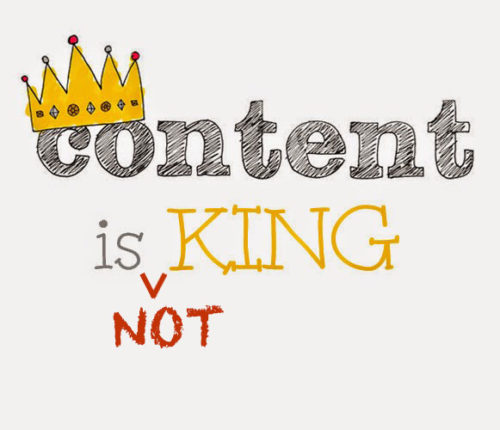Here’s Why Content Isn’t King
Stephen McCance February 26, 2018

Content is king’ is a phrase that’s getting used with increasing and alarming frequency by those who claim to be SEO experts. Here we take a look at just a few of the many reasons why this belief is incorrect.
Ok, so first of all we’ll concede that content is extremely important in relation to SEO, that’s uncontested. But king? No. Absolutely not. Any of you reading this who work in SEO and actually believe that content is king, ask yourself the following question; when was the last time you saw a website that had an informative, well written and, frequently updated blog, along with page content worthy of a Man Booker Prize, but that was devoid of page titles, loaded at a snail’s pace and was fraught with code errors rank well? Didn’t think so.
The reason that content isn’t king, is because that simply wouldn’t happen. Although undeniably important, content is far from the only consideration that needs to be taken into account when trying to effectively optimise a website. Unfortunately, over the past few years it’s become apparent that increasing numbers of people working within the digital marketing industry are failing to recognise the importance of technical SEO and off-page strategies (yes, we mean the dreaded ‘L’ word – links!). Whilst the following is by no means a comprehensive or exhaustive list, we’ve put together a few points to serve as a reminder that there are other critical elements of an SEO strategy that you just can’t succeed in SEO without having.
On-page optimisation
This may appear to be an obvious point, but it’s actually one of the most commonly neglected/worst practiced SEO points that we see, for various reasons. At the beginning of any SEO project, time should be taken to ensure that all on-page elements, such as page titles, are fully optimised and in line with your chosen keywords. The keyword targets themselves should have been chosen carefully with a view to aiming at terms that will actually bring in website visitors rather than aiming for pointless rankings for things users don’t search for, and titles should follow best practice guidelines on format and length, as well as being relevant to the page they’re describing. There’s a whole host of on-page elements that we could go into, but it would end up being a blog post in itself!
Defined website structure
One of the first things any SEO professional should look into is the overall structure of the website they’re working on. For those of us who have been working in the industry for a long time, this becomes second nature when looking at any website you visit. The menu structure and URLs need to accurately reflect the hierarchy of the website so that search engines can best determine the layout, and the relevancy of each page. For example;
Priority 1: redcowmedia.co.uk
Priority 2: redcowmedia.co.uk/seo-manchester
Priority 3: redcowmedia.co.uk/blog/Baidu-vs-Google-Which-Search-Engine-Has-The-Advantage
There are three clear tiers on the above example which rank in order of priority and are relevant to different things; digital marketing, SEO Manchester, and Baidu vs Google.
Mobile optimisation
Having become increasingly important over the past few years, and especially with the tipping point in mobile searches seen in 2015 beyond 50% of all searches performed, having a website that’s fully optimised for mobile devices is absolutely crucial to attaining organic visibility. This is especially so with Google’s Mobile First update set to fully roll out across all searches in 2018, meaning your website will be judged primarily on it’s mobile version rather than the desktop equivalent. Things such as page layout, load speed and even button size feature heavily in optimising a website for mobile devices.
Relevancy
Going back to keyword research, the topic of each page on a website should be both apparent and consistent. Yes, page content comes into this, but again, it’s not the only factor that search engines use to determine what a page is about. The topic of the page should be consistent across other on-page items such as the URL and title. Having great content on the page that’s relevant to a certain topic is highly unlikely to rank the page on its own.
Links
Here’s a shocker – links are still a major ranking factor. Yes, ladies and gentlemen, it’s 2018 and links are still important in your website’s ability to rank well. By saying this we obviously don’t mean you should revert to building links from anywhere on a ‘the more the merrier’ type of basis, but the fact remains that your link profile still plays a huge part in how visible your website is in search results. A natural looking profile of quality links that are also relevant to your website is absolutely essential. If your website isn’t linked to then by search engine standards it’s untrusted, and an untrusted website won’t be shown to users. It takes years of expertise to determine just how to build up the right backlink profile, and how it should be done varies heavily from one website to the next.
Although this is just a taster of some of the many critical factors that an SEO strategy should be taking into account, we hope it serves to expel the rumour that ‘content is king’. So the next time you hear the over-used and vastly over-simplistic phrase being used, think twice before believing it to be fact.
